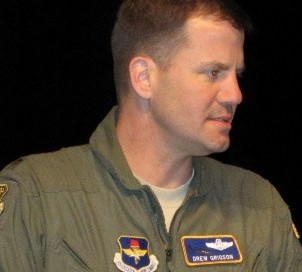
MAJ James Grigson says:
The AMT program provides excellent and realistic training for our profession. Interacting with the media can be intimidating at times, but it also can be critical to the mission. The skills I practiced during the training allowed me to reflect on recent deployments and the lack of training I had received regarding the media and their procedures.
For example, during a recent deployment to Afghanistan I conducted interviews with the media about the progress of my mission, which involved training air crew for the Afghan Air Force. The mission is critical to their self-defense, and the program gained international attention. In one case, I conducted a video interview with a reporter who asked questions off-camera. I failed to prepare thoroughly for the interview. As a result, I rambled nervously.
To combat this type of difficulty, AMT instructors offer tips such as researching the reporter’s background and preparing command messages based on strategic themes from higher headquarters. I would have been more successful if I had prepared for the interview and had some of the strategic themes and messages ready to transition the conversation in a direction to support the program.
AMT also provided valuable practical exercises in addition to the academic instruction. The students conduct a press conference in a question-and-answer setting using a fabricated scenario that is based on real events. They are also provided with strategic themes and messages in support of the mission. This provides the student a realistic scenario requiring real-time answers while maintaining composure and delivering professional responses to the questions.
The next exercise was a remote-style interview, which involved sitting in front of a camera with the reporter asking questions from another location. This type of interview is becoming more popular with increased communications technology, because it allows live interviews around the world without requiring the journalist to travel to the austere location. It is a difficult interview because the student must engage with an inanimate object (the camera) while answering the questions.
Practicing interview skills is essential for military professionals as we continue through our career. We are accountable to the American people and have an obligation to inform them on the progress of our missions. Conducting a bad interview due to poor training and practice can have long-lasting detrimental effects on the mission and unit.
Maj James Grigson, ILE 12-02, Staff Group 1C





One Comment on "AMT develops critical skills"
Thanks for posting, Major! Lots of our students come through the class after uncomfortable interview experiences — and come out with the skills to conduct better interviews in the future. For an example, take a look at the last post from MAJ David Martin, who took the class a year ago and put his skills to use in his new position as Provost Marshal at Fort Lee, Va. Part of the reason I’m personally committed to AMT is because of my own experience as a print reporter getting thrown into on-camera interview situations without any training. CGSC has now cancelled Advanced Media Training. But I hope you’ll pass along the lessons you’ve learned here after you leave the college and return to the Air Force. Best of luck to you.